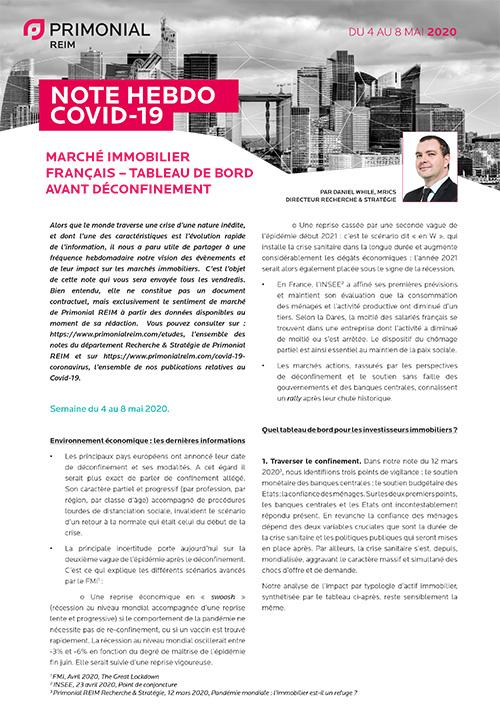- Home
- Studies and research
- #Weekly Covid-19 : week 4 to 8 may 2020
Weekly report : Covid-19
week 4th to 8th may 2020
The main European countries have announced their reopening dates and procedures, but at this point “lockdown-light” would be a more appropriate term than “reopening”. Its sector-by-sector and step-by-step pace (by profession, region and age group), along with burdensome social distancing procedures, belies the scenario of a return to normal that prevailed at the start of the crisis.
The main uncertainty now is whether there will be a second wave of infections once the lockdown is lifted. That’s why the IMF1 has come up with various scenarios:
- A “swoosh” economic recovery, i.e., a global recession followed by a slow and gradual recovery if the pandemic doesn’t take a path requiring a second lockdown, or if a vaccine is found soon. Under this scenario, the global recession would oscillate between -3% and -6%, depending on how well the epidemic has been brought under control by the end of June. It would be followed by a robust upturn.
- A recovery cut short by a second wave of the pandemic in early 2021: this is the so-called W-shaped scenario, which places the pandemic on a long-term trajectory and assumes far worse economic damage, with the recession spilling over into 2021.
In France, INSEE2, the national statistics office, has fine-tuned its initial assessments while maintaining its assessment that household consumption and productive activity have declined by one third. According to Dares, a French public research agency, half of French employees work for a company whose business has been cut in half or been shut down completely. Unemployment benefits are therefore essential to preventing social unrest.
The equity markets, reassured by the prospect of reopening the economy and reliable government and central bank support, have rallied in the wake of their historic plunge.
What does the dashboard look like for real-estate investors? Daniel While explains it on this new note.
1 IMF, April 2020, The Great Lockdown
2 INSEE, 23 April 2020, Point de conjoncture

The team

Henry-Aurélien Natter joined Praemia REIM as Research Manager in January 2018. He has the mission of developing the analyses of the Research & Strategy Department on the real estate markets, the economy and capital in France and in Europe.
Henry-Aurélien Natter began his career at Les Echos Etudes (formerly Eurostaf), then at C&W (formerly DTZ), and lastly at BNP PRE, where he acquired solid and varied experience in real estate research, strategy and finance. He is qualified with an AES degree in Business Management, a Masters Decree in management and SME management, and an International Master in commerce and marketing.
You may also like

- Overview
The post-covid office in Europe: Disruption or acceleration?
Companies have scaled up partial or total remote-working practises and, in reaction, employers have taken another look at their real-estate policies, and employees at their lifestyles.

- Overview
Les fonds immobiliers non-cotés face au deuxième tour de la crise : la résistance des valeurs
La question des valorisations immobilières se pose, au regard du nouvel environnement économique. C’est la situation des fonds immobiliers non cotés (SCPI, SCI, OPCI) que nous examinerons plus particulièrement, en positionnant les stratégies de Praemia REIM dans cette analyse.

- Overview
#Weekly Covid-19 - French real estate market - a pre-opening inventory
week 4th au 8th may 2020. The main European countries have announced their reopening dates and procedures. What does the dashboard look like for real-estate investors ?


 et Firefox
et Firefox 